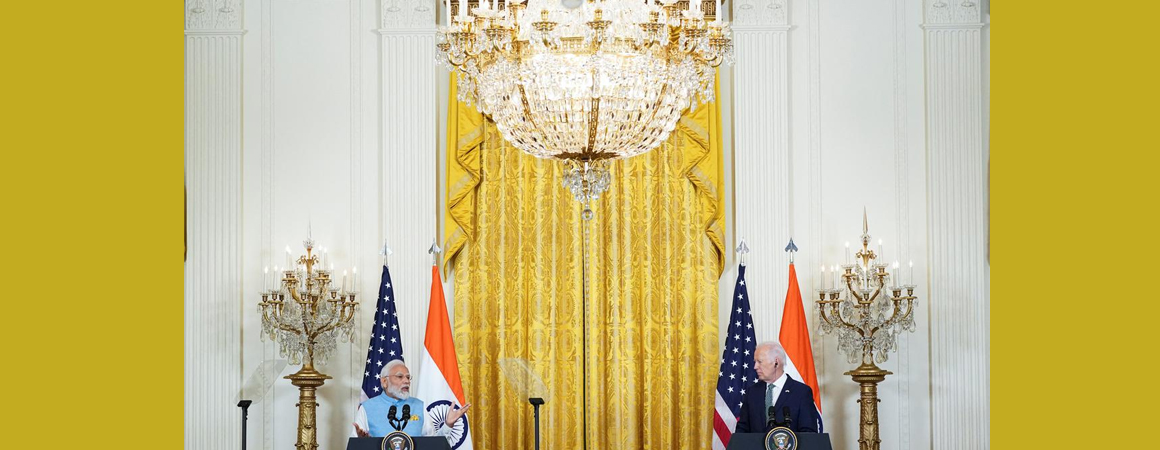It is often the unscripted press conferences that make for more interesting copy
More column inches have been spent over the past week on the question posed to Prime Minister Narendra Modi in Washington than on the answer he gave at what was incorrectly billed an “unprecedented press conference”. Unlike his predecessors, Mr. Modi does not address press conferences in India. He has also discontinued the practice of Prime Ministers taking journalists on Air India One for foreign trips. Previous Prime Ministers would hold on-board press conferences to save time, often having to shout over the hum of the aircraft as we journalists struggled to write notes amid the turbulence.
To be clear, the Washington event wasn’t the first time that Mr. Modi took a question or two from journalists with a foreign leader by his side. In 2015, he took questions when U.S. President Barack Obama was in Delhi, and after talks with U.K. Prime Minister David Cameron in London. He discontinued the practice after that, making only one exception for the insistent German Chancellor, Angela Merkel. However, while at least four Indian journalists were present at the press event in Berlin (this writer included) in 2017, the Ministry of External Affairs chose a safer option, directing a question on the “benefits of India-Germany relations” from the Doordarshan cameraperson instead. In all fairness, questions at such limited press interactions by leaders worldwide are nearly always pre-selected. News is seldom made through them.
It is often the unscripted press conferences that make for more interesting copy. Asked about a contradiction between him and Foreign Secretary A.P. Venkateswaran over an impending visit to Pakistan in 1987, Prime Minister Rajiv Gandhi shocked the press by saying, “You will be talking to a new foreign secretary soon”. Venkateswaran, a self-respecting bureaucrat, resigned immediately. Press conferences on the fractious India-Pakistan relationship in any case regularly go off script: Pakistan President Pervez Musharraf’s press conference in Agra was blamed for the failure of his summit with Prime Minister Atal Bihari Vajpayee in 2001, while the joint press conference between External Affairs Minister S.M. Krishna and Pakistan Foreign Minister Shah Mehmood Qureshi in 2010 ended so badly that India scheduled another meeting only after Mr. Qureshi was replaced. In Goa last month, External Affairs Minister S. Jaishankar and Pakistan Foreign Minister Bilawal Bhutto Zardari had a similarly acrimonious exchange, albeit at separate press conferences. Sometimes leaders have to duck more than questions — both U.S. President George Bush in Baghdad and, subsequently, Home Minister P. Chidambaram in Delhi had shoes hurled at them during press conferences. In both cases, the journalists missed their targets.
Some politicians go to extremes to answer every question. In 2019, Ukrainian President Volodymyr Zelensky claimed a world record by holding a 14-hour press conference, answering questions from about 300 journalists. An earlier record may have been held by Chinese Premier Zhou Enlai in 1960, during the last of four visits Chou made to Delhi (1954-1960). During the week-long visit, talks on the boundary issue ended in a deadlock. A visibly upset Chou held a press conference at Rashtrapati Bhavan on the eve of his departure, taking questions well past 1 a.m. Within two years, India and China were at war. When Musharraf returned to Islamabad after the Agra summit, he issued visas to Indian journalists to attend a press conference there. Much to my chagrin, I was assigned to translate his answers from Urdu to English live on television (I worked at CNN International then) for a marathon three hours.
The fact is that a leader who doesn’t hold press conferences is a rarity. Politicians in and out of power enjoy sparring with the press. Addressing a contingent of 100 journalists after he lost election for Californian Governor, Richard Nixon said angrily, “You won’t have Nixon to kick around anymore, because this is my last press conference”. But his love-hate relationship with the press continued, as Nixon became U.S. President in 1969, and then resigned in disgrace over the Watergate scandal in 1974.
Off the cuff
It is often the unscripted press conferences that make for more interesting copy
More column inches have been spent over the past week on the question posed to Prime Minister Narendra Modi in Washington than on the answer he gave at what was incorrectly billed an “unprecedented press conference”. Unlike his predecessors, Mr. Modi does not address press conferences in India. He has also discontinued the practice of Prime Ministers taking journalists on Air India One for foreign trips. Previous Prime Ministers would hold on-board press conferences to save time, often having to shout over the hum of the aircraft as we journalists struggled to write notes amid the turbulence.
To be clear, the Washington event wasn’t the first time that Mr. Modi took a question or two from journalists with a foreign leader by his side. In 2015, he took questions when U.S. President Barack Obama was in Delhi, and after talks with U.K. Prime Minister David Cameron in London. He discontinued the practice after that, making only one exception for the insistent German Chancellor, Angela Merkel. However, while at least four Indian journalists were present at the press event in Berlin (this writer included) in 2017, the Ministry of External Affairs chose a safer option, directing a question on the “benefits of India-Germany relations” from the Doordarshan cameraperson instead. In all fairness, questions at such limited press interactions by leaders worldwide are nearly always pre-selected. News is seldom made through them.
It is often the unscripted press conferences that make for more interesting copy. Asked about a contradiction between him and Foreign Secretary A.P. Venkateswaran over an impending visit to Pakistan in 1987, Prime Minister Rajiv Gandhi shocked the press by saying, “You will be talking to a new foreign secretary soon”. Venkateswaran, a self-respecting bureaucrat, resigned immediately. Press conferences on the fractious India-Pakistan relationship in any case regularly go off script: Pakistan President Pervez Musharraf’s press conference in Agra was blamed for the failure of his summit with Prime Minister Atal Bihari Vajpayee in 2001, while the joint press conference between External Affairs Minister S.M. Krishna and Pakistan Foreign Minister Shah Mehmood Qureshi in 2010 ended so badly that India scheduled another meeting only after Mr. Qureshi was replaced. In Goa last month, External Affairs Minister S. Jaishankar and Pakistan Foreign Minister Bilawal Bhutto Zardari had a similarly acrimonious exchange, albeit at separate press conferences. Sometimes leaders have to duck more than questions — both U.S. President George Bush in Baghdad and, subsequently, Home Minister P. Chidambaram in Delhi had shoes hurled at them during press conferences. In both cases, the journalists missed their targets.
Some politicians go to extremes to answer every question. In 2019, Ukrainian President Volodymyr Zelensky claimed a world record by holding a 14-hour press conference, answering questions from about 300 journalists. An earlier record may have been held by Chinese Premier Zhou Enlai in 1960, during the last of four visits Chou made to Delhi (1954-1960). During the week-long visit, talks on the boundary issue ended in a deadlock. A visibly upset Chou held a press conference at Rashtrapati Bhavan on the eve of his departure, taking questions well past 1 a.m. Within two years, India and China were at war. When Musharraf returned to Islamabad after the Agra summit, he issued visas to Indian journalists to attend a press conference there. Much to my chagrin, I was assigned to translate his answers from Urdu to English live on television (I worked at CNN International then) for a marathon three hours.
The fact is that a leader who doesn’t hold press conferences is a rarity. Politicians in and out of power enjoy sparring with the press. Addressing a contingent of 100 journalists after he lost election for Californian Governor, Richard Nixon said angrily, “You won’t have Nixon to kick around anymore, because this is my last press conference”. But his love-hate relationship with the press continued, as Nixon became U.S. President in 1969, and then resigned in disgrace over the Watergate scandal in 1974.






NO COMMENT